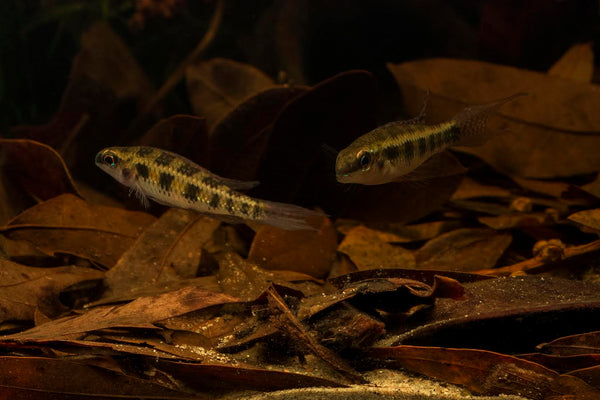- Continue Shopping
- Your Cart is Empty
Giving 'em what they want and letting them "do their own thing." Another case for Nature?
Okay, it's probably me: I think that fish breeders are pretty much some of the coolest people in our hobby. They have a patience and skill set that leaves me in awe...Yet, for some reason, the allure of breeding fishes never really hit me hard to the point where it became a hardcore obsession of mine.
Now, don't get me wrong..
I love the idea of fish breeding. I have bred fishes like livebearers, Apistos, killies and tetras and such over the years. I still play with killifish because they're fun; however, I never got to that "I want 60 different aquariums just for breeding fishes" stage.
I might have deviated a bit into wanting more tanks to experiment with attempting to replicate the natural environments of fishes...And breeding was a sort of "collateral benefit!"
One of the most important things that we can do in the hobby is uncover what it takes to get our fishes to reproduce. It becomes one of the great accomplishments in the hobby. When you provide a fish with optimum environmental conditions, food, etc. and they do what they've done for eons..Well, isn't that the ultimate acknowledgment of our skill as aquarists?

I don't believe that fishes reproduce in our tanks because of "luck." I mean, sure you will occasionally happen to have stumbled n the right combination of water temp, pH, current, light, or whatever- and BLAM! Spawning. However, I think it's more of a cumulative result of doing stuff right. For a while.
I often wonder what is wrong with the idea of a permanent setup- a setup in which the fishes are provided a natural setting, and left to their own devices to "do their thing..."
Now, I realize that a lot of hardcore, very experienced breeders will scoff at this- and probably rightly so. Giving up control when the goal is the reproduction of your fishes is not a good thing. Practicality becomes important- hence the employment of clay flowerpots, spawning cones, breeding traps, bare tanks to raise fry, etc.
Yeah, I totally get that.
The part that I find fascinating is trying to figure out what kinds of environmental conditions a fish needs in order to reach the point where it is comfortable reproducing in an aquarium.

I guess my personal approach to fish breeding has always been, "If it happens, great...If not, I want the fishes to have an environment that mimics the one they're found in naturally." And that works to a certain extent, but I can see how many hobbyists feel that it's certainly not the practical way to do systematic, controlled breeding.
Yet, isn't their something wonderful (for those of us who are not hell-bent on controlling the time and place of our fish's spawnings) to check out your tank one night and see a small clutch of Apisto fry under the watchful eye of the mother in a "Jungle Pod" or, a bunch of eggs of your fave Cory adorning the substrate, or whatever? Perhaps not as predictable or controllable as a more sterile breeding tank, but nonetheless, exciting!

I can't help but ruminate about this "non-approach approach" (LOL)
Not a "better spawning cone,"breeding trap, or more heartily-enriched brine shrimp. Rather, a holistic approach featuring excellent food, optimum natural water conditions, and...a physical-chemical environment reminiscent of the one they evolved in over millennia.
Won't the fishes "figure it all out?"
Yeah, I think that they will.
And my point here is not to minimize the work of talented fish breeders worldwide, or to over-simplify things ("Just add this and your fish will make babies by the thousands!").
Nope.
It's to continue to make my case that we should, at every opportunity, continue to aspire to provide our fishes with conditions that are reminiscent of those what the evolved under for eons. I think we should make it easier for the fishes- not easier for us. Sure, Discus can spawn and live in hard, alkaline tap water.

However, is it really possible that a couple of dozen generations of captive breeding in these types of unnatural conditions could undo millions of years of evolution, which has conditioned these fish to live, grow, and reproduce in soft, alkaline, tannin-stained waters, and that our tap water conditions are "just fine" for them? I mean, maybe it's possible...Hey, I am no scientist, but I can't help but ask if there is a reason why these fishes have evolved under such conditions so successfully? And if embracing these conditions will yield even better long-term results for the fishes?
I just think I'm kind of right about that.

So, again, I think it is important for those of us who are really into creating natural aquariums for our fishes to not lose sight of the fact that there are reasons why- and benefits to- fishes having evolved under these conditions. I think that rather than adapt them to conditions easier for us to provide, that we should endeavor to provide them with conditions that are more conducive to their needs- regardless of the challenges involved.

Something to think about, right?
Have a very Merry Christmas. And enjoy your day!
Stay fascinated. Stay curious. Stay diligent. Stay dedicated...
And Stay Wet.
Scott Fellman
Tannin Aquatics








Scott Fellman
Author